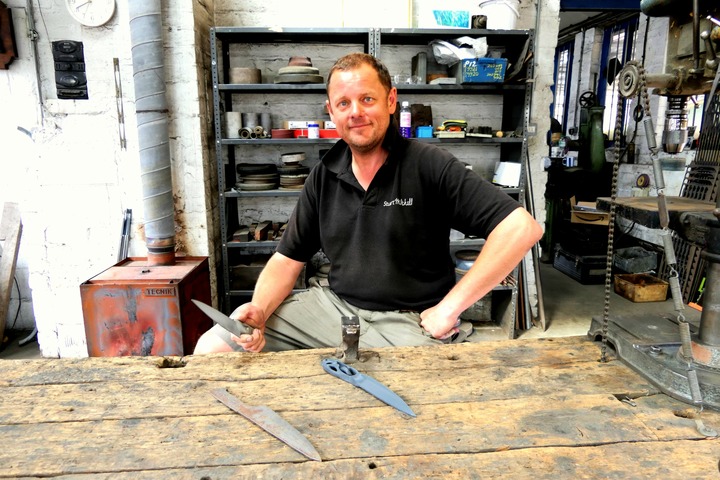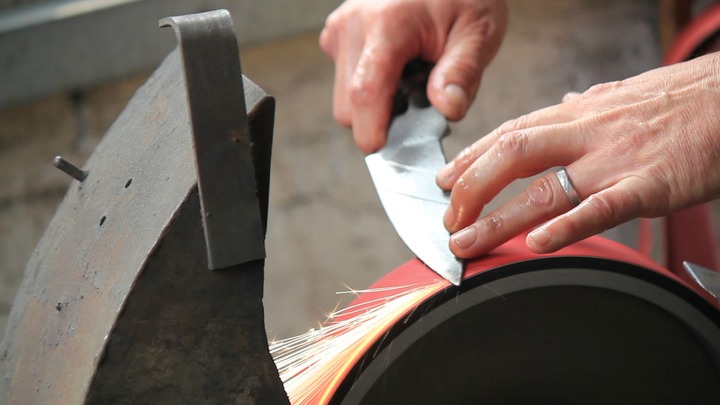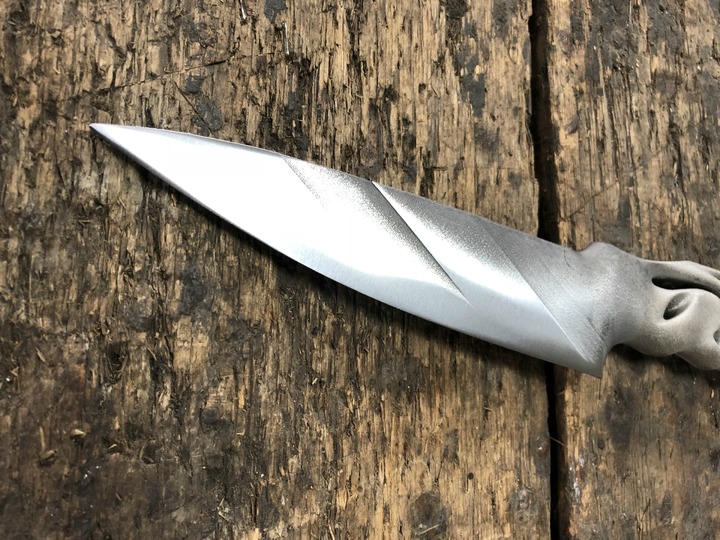Sheffield knife maker at cutting edge of 3D printing technology
21 September 2018A highly respected Sheffield knife maker has put himself at the cutting edge of advanced technology by joining forces with the AMRC to design and develop a bespoke, 3D printed titanium chef’s knife.
Stuart Mitchell, 48, has been making knives for more than three decades, cutting his teeth in the trade as a keen ten-year-old at his father’s knee. His bespoke blades are made using many of the same tools his dad used before him in the same red-brick workshop his family took on in 1980.
Despite his feet being firmly rooted in tradition as a craft maker, Stuart’s curiosity about additive manufacturing made him want to find out whether the advanced 3D printing technology could be combined with his top quality knife making skills to create something truly beautiful and unique.
It led to a project with the Design and Prototyping Group at the University of Sheffield Advanced Manufacturing Research Centre (AMRC) to produce a titanium chef’s knife to demonstrate the technology and allow Stuart to compare and contrast the end product with his own handcrafted knives.
The project is the subject of a ground-breaking exhibition called ‘Digital Mesters: Advanced Manufacturing for 21st Century Knives’ launching on September 26th at this year’s Festival of the Mind - the University's unique collaborative festival showcasing pioneering science, art, engineering and culture across Sheffield.
Design Strategy Manager for the DPG, Andy Bell, said: “This is design-led disruption in the truest sense of the word; a craft maker applying advanced manufacturing technologies and exploring how this could change their business model now and in the future.
"Design methods allow us to explore, through different frames, how we can approach a wicked problem like the introduction of additive manufacturing to an organisation that would never normally approach this technology due to the high perceived risk, cost and knowledge gap.
“We can use design to change perceptions by understanding the way in which small businesses work, their needs and wants, and then developing a response to this in a risk-free way.
“The project has been about understanding what the opportunity is. We provided Stuart with an AM blank which he would normally make himself from sheet metal, grind it and sharpen it up. The difference with what we’ve done is integrating the blade and the handle, which was moulded and customised to a chef’s hand. We then delivered the printed knives to Stuart for finishing.”
Engineers at the DPG used Autodesk’s Simulation Utility for Netfabb software to aid their design and AM build optimisation work for the additively manufactured knife, to analyse the non-conventional support structure design due to its ability to simulate the influence of multiple parts on a build platform.
Luke Hill, Project Engineer, said: “The speed, ease of use, and multi-part simulation ability of Simulation Utility for Netfabb quickly gave confidence that both knives to be printed during the build would benefit from reduced blade distortion thanks to the novel support structure.”
Stuart - whose knives are used across the world in Michelin star restaurants and by members of the Royal family - took receipt of the AM knife at his workshop in Portland Works at the end of summer. He was struck by the quality of the piece.
“I was impressed by the profile of the blade – it replicated very well what I would do by hand, particularly the taper from the spine to the edge,” said Stuart. “It did need a degree of grinding to apply an actual cutting edge but the tolerances of the edge were good to start with, very fine. I didn’t realise it would print that fine.
“With the curvature and the detail in the handle, the hollowed out sections – I realistically can’t do any of that. It’s possible but not practical because there’s probably a week or more’s worth of hand work there. The fact that all that can be added or taken away as it were by changes to a CAD model and then adapted to suit – to increase or reduce weight – none of this I can do, it’s all very hands-on for me.
“Experience has given me a knowledge of the weight and balance of a hand-made knife, what to expect and where to aim, there is also almost always a ‘suck it and see’ element though.
“I love the AM knife, it’s different and hasn’t been done before. Working in that very traditional way and to have something brand spanking new in the workshop is great - what’s not to like? What it perhaps also shows, particularly with all the advances in AM, is that there is still a place for what I do as well.
“An ideal product would perhaps marry the two.”
Stuart accessed the expertise and state-of-the-art capabilities at the AMRC and benefitted from a grant-funding scheme run by the AMRC specifically to help small to medium enterprises fund research projects, under the Catapult SME assistance scheme.



